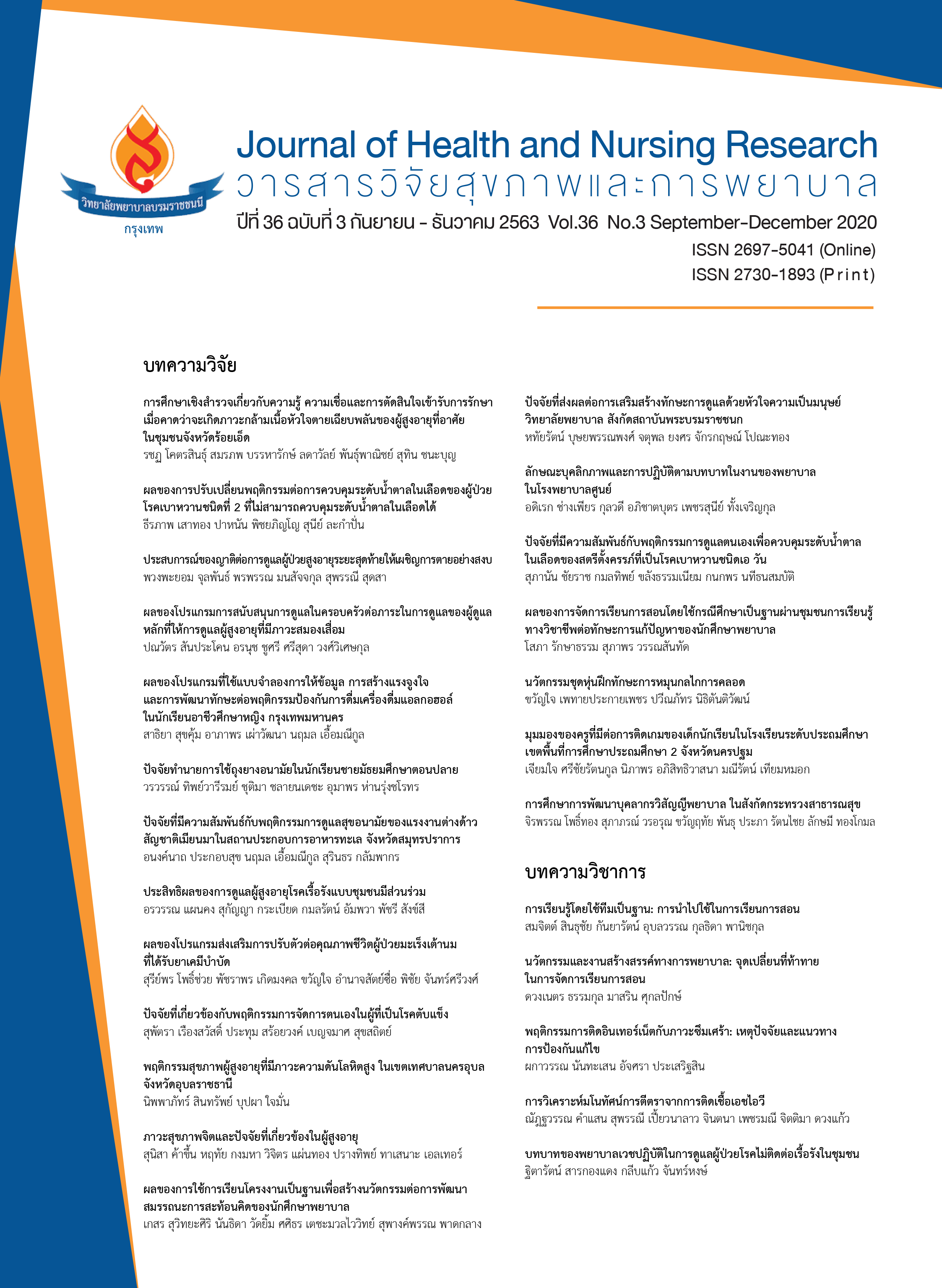มุมมองของครูที่มีต่อการติดเกมของเด็กนักเรียนในโรงเรียนระดับประถมศึกษา เขตพื้นที่การศึกษาประถมศึกษา 2 จังหวัดนครปฐม
คำสำคัญ:
เกม, การติดเกม, นักเรียน, ประถมศึกษา, มุมมองของครูบทคัดย่อ
ปัจจุบันเยาวชนไทยเล่นเกมมากขึ้น นำไปสู่ผลกระทบเชิงลบต่อการศึกษา การมีปฏิสัมพันธ์ทางสังคม และภาวะสุขภาพ การวิจัยนี้เป็นการวิจัยเชิงพรรณา มีวัตถุประสงค์เพื่อศึกษามุมมองของครูต่อสถานการณ์การติดเกม ปัจจัยส่งเสริมการเล่มเกม และแนวทางในการป้องกันและแก้ปัญหาการติดเกมของเด็กนักเรียนในโรงเรียนระดับประถมศึกษาเขตพื้นที่การศึกษา 2 จังหวัดนครปฐม ประชากร คือ ครูที่สอนประจำในโรงเรียนในสังกัดการประถมศึกษาขึ้นพื้นฐานในเขตพื้นที่การศึกษา 2 อำเภอพุทธมณฑล และ อำเภอนครนครชัยศรี จังหวัดนครปฐม ในปีการศึกษา 2560 ซึ่งกลุ่มตัวอย่างถูกเลือกแบบเฉพาะเจาะจง จำนวน 121 คน โดยมีเกณฑ์คัดเข้าคือ ปฏิบัติการอยู่ในโรงเรียนที่ทำการเก็บรวบรวมข้อมูล เป็นครูประจำชั้น และ/หรือมีประสบการณ์ที่มีนักเรียนในชั้นเรียนของตนเล่นเกม เครื่องมือที่ใช้ในการศึกษา ได้แก่ แบบสอบถามข้อมูลทั่วไป ปัจจัยส่วนบุคคล และแนวคำถามสำหรับสัมภาษณ์เชิงลึก เก็บรวบรวมข้อมูลโดยการตอบแบบสอบถามและการสัมภาษณ์เชิงลึก วิเคราะห์ข้อมูลโดยใช้สถิติเชิงพรรณนาในการแจกแจงความถี่ ร้อยละ และข้อมูลจากการสัมภาษณ์เชิงลึกโดยการวิเคราะห์เชิงเนื้อหา
ผลการวิจัย พบว่า นักเรียนที่อยู่ในพื้นที่ศึกษาส่วนใหญ่ไม่ติดเกม มีความสนใจในการเรียนดี เพราะผู้ปกครองและครูดูแลใกล้ชิด มีการส่งเสริมการทำกิจกรรมที่หลากหลาย และครูไม่อนุญาตให้เด็กนักเรียนนำโทรศัพท์มาใช้ที่โรงเรียน แต่อย่างไรก็ตามยังมีนักเรียนบางส่วนติดเกม โดยใช้เวลาเล่นเกมหลังเลิกเรียน หรือ
วันหยุด เพราะมีเพื่อน หรือคนในครอบครัวเล่น ผู้ปกครองบางครอบครัวไม่มีเวลาดูแลอย่างใกล้ชิด ไม่จำกัดเวลาในการเล่นเกม และอนุญาตให้เล่นเกมเพื่อตัดปัญหาลูกหลานรบกวนการทำงาน มีร้านเกมใกล้บ้านและโรงเรียน จากมุมมองของครูผู้สอนเห็นว่านโยบายระดับประเทศในการป้องกันการเล่นเกมของเด็กนักเรียนยังไม่ชัดเจน นโยบายด้านการศึกษาบางประเด็นเอื้อให้เด็กมีเวลาเล่นเกมมากขึ้น สำหรับข้อเสนอแนะเพื่อป้องกันและแก้ไข คือ 1) ระดับบุคคล: การเสริมสร้างการรู้เท่าทันเกมให้กับเด็กนักเรียนและผู้ปกครอง 2) ระดับระหว่างบุคคล: ผู้ปกครองและโรงเรียนส่งเสริมให้เด็กนักเรียนทำกิจกรรมอย่างอื่น การให้ข้อมูลสถานการณ์การติดเกมและผลกระทบกับผู้ปกครอง การส่งเสริมให้ผู้ปกครองดูแลบุตรหลานให้ใกล้ชิดมากขึ้น และการกำกับการเล่นเกมของเด็กนักเรียน 3) ระดับองค์กร ชุมชน และรัฐบาล: กำหนดนโยบายเพื่อลดช่องทางการเข้าถึงเกมของเด็กนักเรียนอย่างชัดเจนและเป็นรูปธรรม เพื่อเป็นการป้องกันปัญหาเด็กติดเกม ผู้ปกครอง ครู และชุมชนควรร่วมมือกันในการส่งเสริมให้นักเรียนได้รู้เท่าทันเกม มีการส่งเสริมการใช้เวลาว่างในการทำกิจกรรมที่เป็นประโยชน์ทั้งที่บ้านและโรงเรียน และการดูแลสิ่งแวดล้อมรอบๆ บ้านและโรงเรียนให้ปลอดจากสิ่งยั่วยุที่จะส่งเสริมให้เด็กนักเรียนในการเล่นเกมมากขึ้น
Downloads
เอกสารอ้างอิง
2. Editorial of Voice online, Revealing the year 6o met children-teenagers sickness with game addiction increased 6 times. [Internet]. [cited2018 Feb]. Available from: http://www.voicetv.co.th/read/ r1voDNTIf. (in Thai)
3. Thaihealthcenter & ThaiHealth Promotion Foundation. ThaiHealth watch 2020. [cited 2020 November]. Available from https://resourcecenter.thaihealth.or.th/ thaihealthwatch/ThaiHealthwatch 2020. (in Thai)
4. Mankeed S, Children addicted to the game Nightmare for parents in the cyber era. [Internet]. [cited 2018 Mar] Available from: http://www.thepbodint.ac.th /topmenu. php?c =listknowledge&q_id=152; 2010. (in Thai)
5. Office of the Strategy of Nakhonpathom Province. Provincial Development Plan 2018-2021;[internet]. [Cited 2020 Nov]. Available from http://www.nakhonpathom. go.th/files/com_news_develop_plan/2016-11_71a0e26cc1c1c8a.pdf. (in Thai).
6. Cultural Strategy and Surveillance Group Office of culture. Report on the results of the mission assigned by the Office of Cultural Watch Office of the Permanent Secretary, Ministry of Culture Nakhonpathom Province Annual fiscal year 2013. [internet]. [Cited 2020 Nov]. Available from https://www.m-culture.go.th/surveillance/files/835/report56/Nakhon_Pathom-56.pdf. (in Thai).
7. Department of Mental Health. The department of mental health recommends 3 terms before children start playing the game. [Internet]. [cited 2020 Oct ] Available from: https://www.dmh.go.th/news-dmh/view.asp?id=30036. (in Thai).
8. Chansawang P. Children with Behavioral and Emotional Disorders management. Foundation for Children with Disabilities. [cited 2020 Nov]. Available from https://fcdthailand.org/librarytype/เด็กบกพร่องทางพฤติกรรม/;%2020. (in Thai).
9. Thongsri P, Chiangkong A. Community health nurse’s roles in school health service. Journal of Public Health Nursing 2018;32(2):203-22. (in Thai)
10. Charoenwanit S, Game addiction behavior: effects and prevention. Journal of Science and Technology 2014;22(6):871-79. (in Thai).
11. Pornnoppadol C, et al., Research report on the study of factors to prevent game addiction in children and adolescents. Mahidol University, 2009. (In Thai)
12. Chin SW. Wen BC. Why are adolescents addicted to online gaming?. An interview study in Taiwan, Cyber-psychol Behav 2006;9:762-66.
13. Hongsibsing P, Termsombatthaworn N, Narinrat S. Nedds to solve the problem of the online games and internet of young people in du tai municipalit Nan. RMUTP Research Journal Special Issue, The 5th Rajamgala University or Technology National Conference. [Internet] [cited 2020 Oct 6] Available from: https://repository.rmutp.ac.th/ bitstream/handle/ 123456789/1676/IRD_58_167.pdf?sequence=1&isAllowed=y; 2015. (in Thai).
14. Techaniyom K, Chotchakornpan K. The causal relationship of factors affecting online gaming addiction in the high secondary school students in Bangkok. [internet]. [cited 2020 Oct 10] Available form: http://www.conference.phuket.psu.ac.th/proceedings/psu_open_week _2011/data/fis/fis03 _paper.pdf; 2011. (in Thai).
15. Paosawad C, Sooktap C, et al., editors. A guide to caring for school-age children with behavioral-emotional problems for health personnel (Trail version). 2nd ed. Bangkok: Printing house agricultural cooperatives of Thailand Limited; 2016. (in Thai).
16. Srisuwan P, Tangkiratichai S, Patchanasoontorn N. Computer game playing, family functioning and health promotion behaviors among the school – aged children in Khonkaen Municipality. Journal of Nakhonratchasimw College 2010;4(2):3-10. (in Thai)
17. Siitirak N, editor. Siriraj psychiatry DSM-5. 2nd ed. Bangkok: Department of Psychiatric. Faculty of Medicine, Siriraj hospital, Mahidol University; 2015. (in Thai).
18. Aunjaroenkul W, Teaukul S. Game addiction among the primary school students under the Bangkok metropolitan education office in Sathorn district. Journal of Clinical Psychology 2017;48(1):1-12.
19. Kolkijkovin V, Wisitpongaree C, Techakasem P, Pornnoppadol C, Supawattanabodee B. Computer game addiction: risk and protective factors in students in Dusit district, Nangkok. Vajira Medical Journal 2015;59(3):1-13. (in Thai).
20. Kieatroongroueng K, “Game addiction” the treat that threats Thai children (part 2). [cited 2020 Oct] Available from: https://www.thairath.co.th /lifestyle/life/ 1374661; 2018. (in Thai).
21. Kimberly Y. Understanding online gaming addiction and treatment issues for adolescents. Am. J. Family Therapy 2009;37:355-72.
22. Sallis JF, Owen N, Fisher EB. Ecological models for health behavior. In: Glanz K, Romer BK, Viswanath K. editors. Health behavior and health education: theory, researcher and practice. 4th ed. San Francisco: Jossey-Bass; 2008.
23. Apisitwasana N, Perngparn U, Cottler L. Effectiveness of school- and family-based interventions to prevent gaming addiction among grades 4–5 students in Bangkok, Thailand. Psychology Research and Behavior Management 2018;11:103 - 15.
24. Apisitwasana N, Perngparn U, Cottler, L. Gaming addiction situation among elementary school students in Bangkok, Thailand. Indian Journal of Public Health Research & Development 2017;8(2):8-13.
25. Nontachote P, Yuthaphonpinit P, Chuanchaisith T. Strategies to control and alleviate the problem of computer game addiction among high school students in Nonthaburi Province’s Education Zone. Sukhothai Thammathirat Open University Journal 2011;22(2):123 – 36. (in Thai)
26. Charoenwanit S. Game Addiction Behaviors: Impacts and Preventions. Thai Journal of Science and Technology 2014;22(6):871-79. (in Thai).
27. Supachai K, Ecological Model: An Intervention Model Addressing Factors Influencing Health Behaviors. Thai Journal of Nursing and Midwifery Practice 2016;3(1):17-27. (in Thai)
ดาวน์โหลด
เผยแพร่แล้ว
รูปแบบการอ้างอิง
ฉบับ
ประเภทบทความ
สัญญาอนุญาต
บทความที่ได้รับการตีพิมพ์ เป็นลิขสิทธิ์ของวารสารวิจัยสุขภาพและการพยาบาล (วิทยาลัยพยาบาลบรมราชชนนี กรุงเทพ) ไม่สามารถนำไปตีพิมพ์ซ้ำในวารสารฉบับอื่น


















